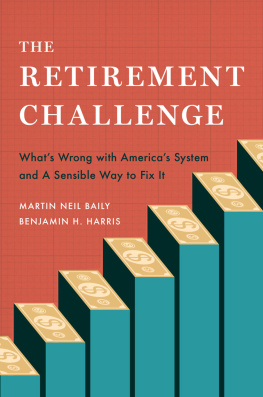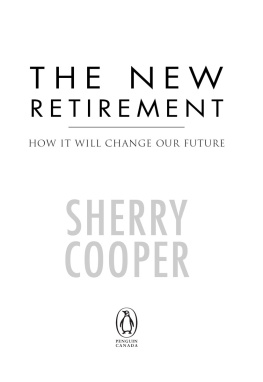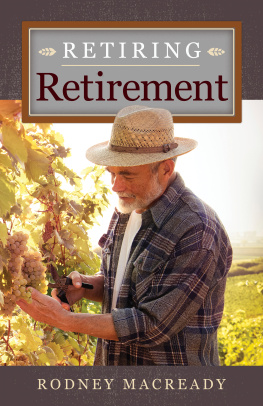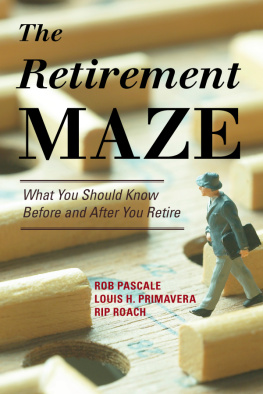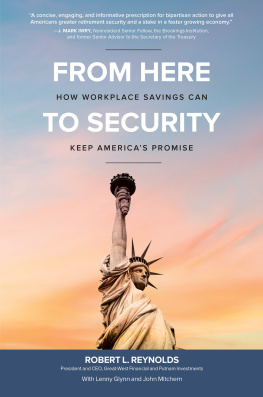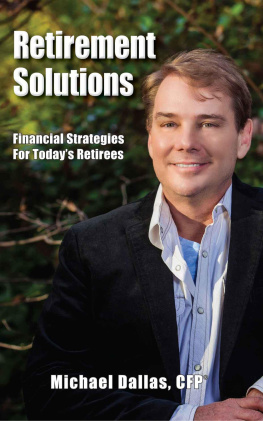The Retirement Challenge

Oxford University Press is a department of the University of Oxford. It furthers the Universitys objective of excellence in research, scholarship, and education by publishing worldwide. Oxford is a registered trade mark of Oxford University Press in the UK and certain other countries.
Published in the United States of America by Oxford University Press
198 Madison Avenue, New York, NY 10016, United States of America.
Martin Neil Baily and Benjamin H. Harris 2023
All rights reserved. No part of this publication may be reproduced, stored in a retrieval system, or transmitted, in any form or by any means, without the prior permission in writing of Oxford University Press, or as expressly permitted by law, by license, or under terms agreed with the appropriate reproduction rights organization. Inquiries concerning reproduction outside the scope of the above should be sent to the Rights Department, Oxford University Press, at the address above.
You must not circulate this work in any other form and you must impose this same condition on any acquirer.
CIP data is on file at the Library of Congress
ISBN 9780197639276
eISBN 9780197639290
DOI: 10.1093/oso/9780197639276.001.0001
This book is dedicated to our families. To Vickie Baily and Jessica Harris for their support during the writing of the book, and to our children and grandchildren, current and future, in the hope that they will have better choices as they face their retirement challenge.
Contents
Tables
Figures
We wrote this book to reset the policy conversation around retirement. For years, the retirement conversation in policy circles has focused largely on fixing Social Security and Medicare, each of which has a trust fund that will be exhausted in the coming years. To be sure, Social Security and Medicare pose daunting challenges, but Americans overall retirement challenge is much broader.
As we explain, a sound retirement requires changes throughout the current systemfrom private insurance to retirement saving accounts to the labor market for older workers. Fortunately, all these changes are undoubtedly achievable. Indeed, we can dramatically improve the retirement system through a series of incremental reforms that largely preserve the current system.
As we also explain, retirement policy is about much more than retirement. Because retirement programs are a large part of the federal budget, retirement is about fiscal choicesand the policy tradeoffs inherent in spending trillions of dollars a year to achieve retirement security. Because the savings of American workers provides capital for investment that expands the economy, retirement policy is about macroeconomic growth. And because economies depend on labor, both in terms of the number of workers and the skills of older workers, retirement policy is about the labor market.
Retirement policy is also about equity. We believe strongly that anyone who spends most of their life working deserves to retire toward the end of it and not retire in poverty and hardship. We also believe that middle-class workers who have spent decades in the labor market and have made responsible choices along the way deserve a reasonable degree of prosperity in retirement.
Ultimately, however, retirement is about happiness. As people get older, they derive happiness from doing what they love outside of work, a retirement system that offers more hours of leisure makes people better off. But a sound retirement system isnt just about enabling older workers to spend more time in retirement: its also about security. Its about a system in which workers know that they can turn their savings into a steady cash flow in retirement, older Americans can age comfortably in their own homes, and older workers can decide when to retire.
In sum, we wrote this book to change American retirement in a way that makes people better off throughout their working lives and after.
Thats the why, but we also want to explain the how. In short, we wrote this book with a lot of help. The effort was launched with generous grants from the Alfred P. Sloan Foundation and the Laura and John Arnold Foundation (now Arnold Ventures LLC), which provided funding to the Brookings Institution and the Kellogg School of Management for us to elicit policy reform ideas from some of the nations top experts in retirement policy. We commissioned top economists and lawyers to propose manageable policy reforms that would improve the retirement system.
Our first event, in January 2019 at the Brookings Institution, for which we commissioned papers, focused on policies to enable people to work longer. Notable economists Robert Clark and John Shoven argued for Social Security reform to incent workers to continue working. Alicia Munnell, a titan in the field of retirement, and co-author Abigail Walters, proposed reforms to both encourage people to work longer and to better understand issues related to retirement. Jim Poterba, a world-renowned economist and retirement expert gave a masterful exposition of the current retirement system and where it stands.
Over the next two years, we held three more events and commissioned more papers. The second event was at the Kellogg School of Management and focused on annuity reform. We returned to Brookings for our third event, which focused on reforming reverse mortgages. By the time we reached our fourth event, for which we focused again on policies that would encourage people to work longer, COVID-19 was in full swing, and we were forced to hold the event virtually.
To help guide our work, we formed an advisory board that included experts from academia, industry, and advocacy organizations. We met with the board several times a year and relied on the board to guide our selection of topics and of the experts from whom to commission papers.
The work built on itself. We wrote papers to frame the discussion around each event to provide an overview of the relevant economic issues and help participants at the events and readers of the reports understand the current state of play around each topic. We wrote many op-eds on retirement policy, with one of us contributing regularly to the Wall Street Journal and the two of us jointly writing pieces for CNN.com, Fortune, and other outlets. We appeared on radio shows, spoke on podcasts, and discussed issues with the media. We spoke with Congressional staffs, other economists, and experts in the field.
We felt the time was right to combine the lessons wed learned into a book, and the Smith Richardson Foundation generously provided funding for us to do so. We found a brilliant editor in Lawrence Haas, began writing, and, in the midst of the pandemic, retreated to our home offices to continue working on the manuscript.
As we were writing, we seemed to be aiming at a moving target. On some days, Americas retirement system seemed to be changing before our eyes. Long-term care facilities were hotbeds for transmitting COVID-19, and residents suffered heartbreaking rates of death. The stock market crashed, albeit temporarily, and some experts predicted widespread declines in housing priceswhich would sharply curtail the resources available for retirees. Unemployment soared for workers overall, and older workers left the labor market in droves. We wondered whether retirement as we knew it was ending and whether we were writing a book for an earlier time.

